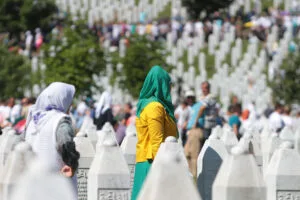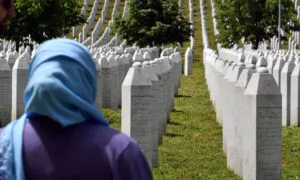Brussels – July 11, 2024, is the first International Day of Reflection and Commemoration of the Srebrenica Genocide, twenty-nine years after the massacre of at least 8372 Bosnian civilians in the final year of the war in Bosnia and Herzegovina. “It was one of the darkest moments in modern European history,” said the EU High Representative for Foreign Affairs and Security Policy, Josep Borrell, and the Commissioner for Neighborhood Policy and Enlargement, Olivér Várhelyi, on the occasion of the commemoration of the victims of one of the bloodiest massacres on European soil since World War II, before those carried out by the Russian military in Ukraine.

Srebrenica Genocide Remembrance Day was established on May 23 with the vote of the UN General Assembly, where 84 countries were in favor, 19 against, and 68 abstained (in addition to 22 who did not vote). The resolution “condemns without reservation” any denial of the Srebrenica genocide as a historical event, as well as “actions that glorify those convicted of war crimes, crimes against humanity and genocide by international courts.” All member states are also asked to develop “appropriate programs,” including in educational systems, “to prevent denial and distortion and the occurrence of genocide in the future.” The united front in support of the resolution was soured by the abstention of Greece and Slovakia, but especially by the opposition of Viktor Orbán‘s Hungary, the major ally of Serbia and Republika Srpska (the Serb-majority entity of Bosnia and Herzegovina) in the Union.
In July 1995, there were at least 8,372 Bosnian civilians – all male, ethnic Muslims – massacred by the Bosnian Serb forces of Ratko Mladić (not coincidentally referred to as ‘the butcher of Bosnia’) near the Bosnian enclave of Srebrenica in eastern Bosnia. Nearly 30 years have passed since that massacre-the largest in terms of casualties in a few days – of a genocide that lasted three-and-a-half years, from April 1992 to the Dayton Accords of December 14, 1995.

“We call upon the leaders to reject divisive rhetoric and act with truth, justice, trust, and dialogue,” Borrell and Váhrelyi said. “Healing the wounds of the past requires acknowledging and teaching the historical facts, honoring and remembering the victims, identifying those still missing, and bringing all perpetrators to justice,” and, most importantly, “confront the roots of hatred that led to the genocide.” Two years ago, the film Quo Vadis, Aida? based on the events that saw thousands of Bosnian women in Srebrenica received the 2022 Lux Award of the Audience for European Cinema in the hemicycle of the European Parliament. “We need to build together bridges to reconciliation. There is no place amongst us for those who deny genocide, attempt to rewrite history, and glorify war criminals.,” Borrell and Váhrelyi added.
That of the Srebrenica genocide is one of the many reasons of confrontation between Brussels and Aleksandar Vučić‘s Serbia, but also within Bosnia and Herzegovina, where Bosnian Serb President, Milorad Dodik, is attempting a secessionist project and is one of the strongest deniers of the excesses of the 1990s war. The rifts within the Balkan country and the European Union itself — for which Hungary is the thorn in its side — risks jeopardizing Sarajevo’s path to EU membership, despite the European Council’s decision on March 21 to begin accession negotiations. “We reiterate our unequivocal commitment to Bosnia and Herzegovina’s future in the EU as a single, united and sovereign country,” the High Representative Borrell and Commissioner (Hungarian) Váhrelyi concluded.
Find more insights on the Balkan region in the BarBalkans newletter hosted by Eunews
English version by the Translation Service of Withub





